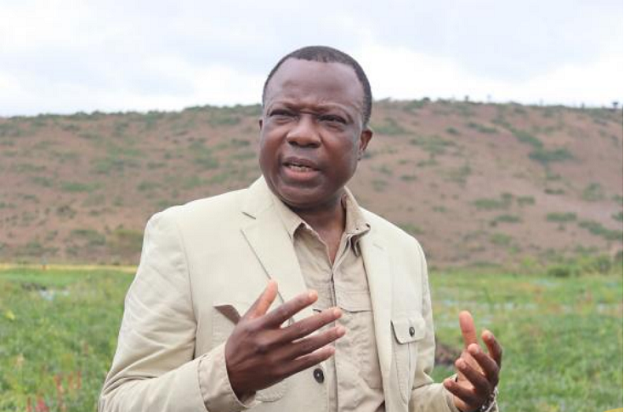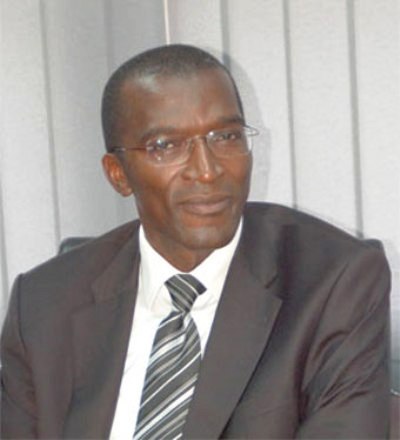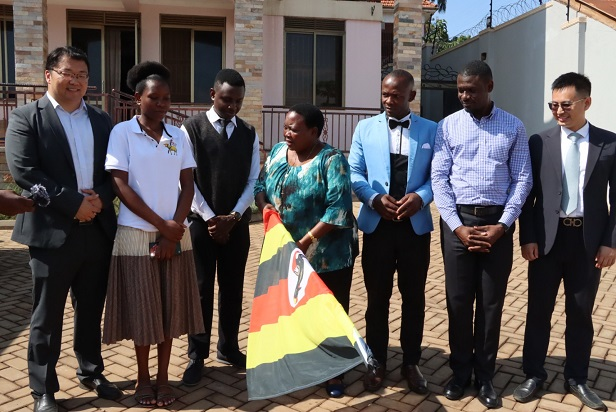French Ambassador to Uganda H.E Jules-Armand Aniambossou speaks to the media in Nakivale Refugee settlement on Tuesday August 9 2022.
The French Ambassador to Uganda Jules-Armand Aniambossou has asked development partners to skill refugees on agricultural practices to address challenges of food insecurity and climate change.
Aniambossu says imparting innovative agricultural skills to refugees will go a long way in ensuring that they are able to provide food for themselves other than relying on being given food every day.
“We all know that it’s better to skill someone to fish than to come every day to give him fish,” says Aniambossou.
Aniambossou made the remarks on Tuesday in Isingiro Town during his visit to Nakivale Refugee Settlement to inspect food security and livelihood projects supported by the French Government.
The 1.2 billion Shillings food aid project is being implemented by Action Against Hunger (ACF) in both Nakivale and Kyamgwali refugees Settlements in Isingiro and Kikube Districts respectively.
According to Aniambossou, innovation should be part of every partner’s support to refugees that will see them become more independent after gaining skills.
He says stakeholders including the private sector and the government with a focus on agriculture should be involved in helping refugees with new modules on agriculture that propels them into not only the national markets but the regional and international markets.
1,000 households have benefited from the French government-funded project aimed at improving the nutrition, food security, and self-reliance of refugees in South Western Uganda.
In Kashare Village, Rushasha Sub-county, in Nakivale Refugee Settlement, a total of 169 refugees and host communities under Kashare Farmer’s Field school have benefited from the food aid project.
The farmers were supported with skills in growing cabbages, carrots, onions, and tuber edible crops like potatoes and fruits.
Anthony Gashumba, the Chairperson of the farmer’s group and a refugee from Rwanda says the initiative has helped both the host and refugees to have consistent stock of vegetables amidst the prolonged dry spell.
Gashumba also noted that the beneficiaries of the food aid are able to earn money from the sales of vegetables grown in the garden, something that has helped to improve their livelihood.
“We appreciate this initiative brought to us the refugees and the host communities. It has helped us to fight not only malnutrition but gives us money,” He told Uganda Radio Network in an interview.
He however says that the end of financial support this year for its continuity may cripple the idea that is yet to be replicated by the beneficiaries and appealed for funding from the French government and other partners.
The one-year food aid project was rolled out in June last year and ended in July this year.
But the French Ambassador in response to the beneficiaries noted that the project was a success adding that they won’t hesitate to request more funding after making their reports to the French government.
The impacts of climate change influenced by the degradation of natural forests, and limited land space for farming has greatly affected food production among refugees in the Nakivale Refugee settlement.
Albert Siminyu, the Country Director of Action Against Hunger says despite the challenges being faced by the refugees, they will continue to lobby with various development partners in ensuring they are addressed.
Nakivale Refugee settlement is home to some 145,613 refugees’ the majority of whom are from the Democratic Republic of Congo (DRC).
-URN





